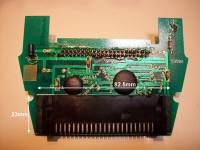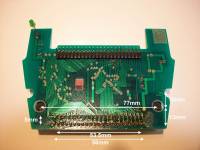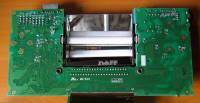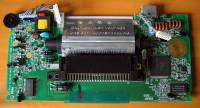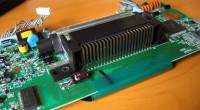|
|
ForumsSega Master System / Mark III / Game GearSG-1000 / SC-3000 / SF-7000 / OMV |
Home - Forums - Games - Scans - Maps - Cheats - Credits Music - Videos - Development - Hacks - Translations - Homebrew |
View topic - SMS Reader + Parallel -> USB converter
 |
| Author | Message |
|---|---|
|
SMS Reader + Parallel -> USB converter
|
|
I'm using an iMac, with no parallel ports, or real ability to add them. I was under the impression that the Tototek cart used USB or Parallel, but it seems it just uses USB for power and all writing is done via the parallel port.
A quick query - has anyone tried using the SMS Reader (or a Tototek reader) with a Parallel -> USB converter under Windows? These are the handy jobs that let you use legacy parallel printers via USB, and work without extra drivers in Windows XP (which I can run in VMWare). Some end with Centronics plugs, others with standard 25 pin parallel ports - example here. I've seen anecdotal evidence that some commercial EEPROM programmers work with these. Failing that, I'll have to try and track down an old Windows laptop... |
|
|
|
|
|
|
|
I looked into this matter myself after having recently aquired a tototek cart.
The problem is in the design of current sms reader/writers. The old school way of doing comms via parallel (think DOS era) is to directly access the parallel port via its I/O address. This method has a couple of problems on modern hardware. The first is that newer operating systems (Windows XP & up) no longer allow direct access to the parallel ports to directly control signalling via individual pins. This can be gotten around in XP via special kernal level drivers. The second problem is that systems that no longer support the legacy ISA bus are not capable of communicating via the required I/O address. This means that USB->Parallel or even PCI based parallel expansion cards will not work as they can not be assigned to the required address range. It is possible to emulate the same behaviour by sending encoded characters over parallel but the reader/writer hardware has to also support this method of communication, which at present none of them do. It would probably be easier just to make a USB based reader/writer as it would be to make a more compatible parallel based device. Unfortuantely no one has yet stepped up to the challenged of designing a new reader/writer with this sort of functionality. |
|
|
|
|
|
|
|
This topic has come up more than a few times here.
I liked this thread. I know I would build a USB reader/writer given the chance and good schematics. |
|
|
|
|
|
|
|
I'm aware of a few issues:
- Inability to choose non-standard port addresses. I just checked my SMS Checker software and it's guilty, but it ought to be a 1 minute fix (make the combo box editable) and you can hex edit for now. You get the same issue with add-in PCI parallel port cards. The Tototek software is packed so it's very hard to hack it and they don't want to help out. - Failure of devices to support legacy parallel port modes. SMS Checker needs bidirectional mode compatibility, I'm not sure what mode the Tototek device uses (it seems faster so it's probably a newer mode). Since basically every printer that you find uses the fastest ECP mode, many USB devices only support that. |
|
|
|
|
|
viletim!
|
|
|
What about the USB -> asynchronous serial adaptors... do they work ok? A serial SMS cart reader/writer based around a cheap microcontroller would be farily easy to design. It could also be made to operate with generic terminal emulation software. Just a thought...
The good old SMSReader has it's own problems too... like not meeting the electrical standards of a modern parallel port (it really should have been designed with LS/HCT parts, not 4000). |
|
|
|
| I've got an even better idea.... Why not add a z80 SIO chip to the SMS? Replace the internal ROM with something useful and the SMS itself can do the dumping. Would be useful for delelopment too I imagine. | |
|
|
|
|
|
yes now thats exactly what ive been thinking about for ages, could this seriously be done?? |
|
|
|
|
|
|
I don't see why not. On the hardware side you'd need a z80 SIO, a MAX232 or equivalent, a programmable rom ((E)EPROM, flash, etc...a BIOS eeprom from an old motherboard would do), and probably a logic chip of some variety (for address decoding). All cheap and easy to get. For the software you'd need to program simple XModem transfer routine and some kind of user interface for the terminal. I think this kind of software would be trivial in comparison to doing anything at all with USB. |
|
|
|
|
|
|
|
On a vaguely related note, is it possible to hot-swap Game Gear cartridges?
I considered writing a program that would copy itself to RAM, so you could remove the existing cartridge and insert the one you wished to dump. The program in RAM could then dump the cartridge over the Game Gear's external data port. |
|
|
|
|
|
|
|
I'd guess it's the same deal as hot-swapping SMS carts - the bus is unbuffered so you can get enough junk/spikes/whatever on there while plugging the cart to reset the system, so it works sometimes and not others. The GG's super-happy-fun +34V cart pin does give some more exciting component-frying possibilities, though.
The only way to be sure is to give it a try, of course. |
|
|
|
|
|
|
The result wasn't too promising; removing the cartridge seems fine, plugging another one in doesn't seem too work. At one stage it decided it wouldn't switch on again for a few minutes, so I wouldn't advise others experiment with this. It should be easy enough to use a cheap microcontroller to provide a single-chip adapter for an existing SMS reader, providing serial I/O on the other end. PICAXE chips should do the job well (and have numerous advantages, such as not requiring hardware programmers), and there are even USB adapters available for them. With one of the 40-pin monstrosities you could probably even get away with a complete single-chip SMS reader. |
|
|
|
|
|
|
| I made a minor update to the SMSReader software so you can type in any port address. You still have to find that address yourself. | |
|
|
|
|
|
|
Reviving this thread.
Any luck in using SmsReader + software via an USB or PCI parallel port? I'll probably won't be able to find a parallel port on my soon-new computer. Do you think a standard USB to // cable will work ? (I doubt so) |
|
|
|
|
|
|
|
I have one of these in my machine (though I got it for much cheaper than their list price), and it has worked beautifully (thus far) with software that lets you configure the parallel port base address. It is based around this chipset.
If a piece of software uses "io.dll" by Fred, then I've written this thing that acts as a drop-in replacement that lets you remap the port address. The Willem chip programmer software works fine with this replacement DLL. The same technique could be used to write replacement DLLs for other "NT-friendly" I/O port access libraries, if they're dynamically linked external DLLs. I have yet to get it working with SMS DreamWriter, sadly (aforementioned packed EXE problems). I do not have an SMSReader so cannot check with my PCI card, but given that most other software I've used that accesses the parallel port directly (TiLP, PPJoy, Soulmate drivers, Willem programmer, various homebrew projects) works fine I can't see there being problems. At the time of writing its drivers are unsigned, which may be a concern if you're going to use a 64-bit OS. Another option is virtualisation software; there may be some out there that lets you remap a virtual port at 0x378 to a host port at a non-legacy base address. I'm yet to find any software that does this, though. Edit: The chipset docs mention "Re-map function for legacy ports" - this only applies to operating systems that supports this feature, which discounts recent versions of Windows (I believe 9x will let you, but not NT). |
|
|
|
|
|
|
|
Thanks! Do you think a similar USB-based system exists or can exists ?
I'll revert to the PCI one as a backup plan. |
|
|
|
|
|
|
|
Cheap USB devices may only support the 99% used ECP/DMA mode, whereas homebrew hardware almost always uses old-fashioned EPP mode. I can't guarantee either way, I don't have a USB->parallel adaptor and right now I don't have an SMSReader either. More expensive/industrial devices (I guess a PCI card is industrial-targeted) are more likely to be compatible because they are aiming for compatibility with more than HP Happy Photo Fun Time Printers.
Edit: It seems non-cheap USB adaptors cost as much as the PCI card. So it might be the best option. Problem is, new computers may not even have PCI slots soon. A page saying USB adaptors don't work |
|
|
|
|
|
|
You can pick up PCI Express cards, but they're even more ludicrously expensive, and still don't help the problem that they'll be given a non-legacy base address. This design looks quite interesting, as it seems to be doing some sort of port access trapping in a driver. I wonder if such a system could be used to redirect any port writes under NT... |
|
|
|
|
|
|
| Of course, a more interesting project might be to re-engineer the SMSReader with a USB connection. Of course I'm incapable of this, but as I understand it some latches for the various address/data/control lines and a microcontroller that can talk USB ought to be able to do the trick. | |
|
|
|
|
|
|
Charles Macdonald did make something like this, but his reader was flash based, I can't remember the exact specifics but I believe he used an Atmel controller chip for the USB side of things, I don't know if it would work or not using this method.
Just throwing out some ideas. Myself and DMEnduro were talking about this rather extensively on MSN so id be willing to try and dig up some info on perhaps improving the design to make it USB capable. If it were USB capable would it have enough power to use data + power in the one line? |
|
|
|
|
|
|
| If a new reader is engineered, I can provide various kinds of cartridges that can't be dumped reliably yet (CodeMasters, 4 Pak, several EPROM or backup based cartridges, 1 MB GG cards, etc). | |
|
|
|
|
|
| I was talking to a friend about this recently, who is doing engineering and designed/built a hard drive based MP3 player. He is going to have a look at it. | |
|
|
|
|
|
|
A couple of things are needed:
1. Ability to control all of the cartridge signals. For example, Codemasters cartridges are thought to need the CLOCK line to be pulsed for their mapper to work. The parallel port has only 5 control lines available and they're all used in the SMSReader design, so there's no way of dealing with it. To dump all cartridges we need to (semi-)independently control all the pins on all cartridges. 2. Ability to detect the signal sequences needed. This presumably involves an oscilloscope and some probes and would not be at all simple. The alternative is just guesswork (since we know what the lines are for, just not the exact timing of the signals). 3. A lot of input and output pins. The parallel port has 8 I/O lines for data and 5 control signals, 2 of which are used for addressing (reset and increment for a 16-bit counter). Having 16 address lines as well as 8 data lines would make it possible to do random access and thus allow flash-based devcarts, but microcontrollers rarely have so many I/O pins. So presumably latches might be a solution. Another possibility is something that can plug into the cartridge port and dump from the expansion port by running Z80 code. If it could do that and then package things up in small chunks (say, 4KB of data in each USB packet using system RAM for buffering) it ought to be very compatible (since the cartridge would be receiving all the usual signals), perhaps less so with non-SMS stuff. But it would all be more complicated than a device with a cartridge slot and a cable that goes to a PC. |
|
|
|
|
|
viletim!
|
|
| Charles' design used a USB interface module which came with drivers for Windows, Mac, etc. From what I can see that's the only way to provide a USB interface without having to write a bunch of low level drivers. | |
|
|
| There are issues with USB and drivers, but it seems suitable devices are appearing now. I don;t know if they have installable drivers or if they appear as standard USB devices. As an extreme case, you could have one appear as a USB keyboard and type the data into a hex editor, for example. | |
|
|
|
|
viletim!
|
|
This is a good idea. And easily acheivable I'd say.
I don't think this is really necessary... Just give the user lots of control over how the cartidge lines can be manipulated through the interface software. That way the user can experement to find out how an unknown mapper works.
An 8051 based microcontroller with 32 i/o lines and UART will cost all of US$1.50 in single quantities. It's this USB requirement that makes the project so daunting... hardware is easy, software is a nightmare.
I think a stand-alone device is more useful, and the function of every cartridge pin is well understood by now anyway. A dumper with three sockets would be the best. A 50 pin edge for master system, a 44 pin for SG-xxx, Mark III, jap SMS, etc, and a Game Gear connector. |
|
|
|
Not sure what kinds of features people are looking for, but all the information and project files for my USB-based SMS cartridge reader are still available online: http://cgfm2.emuviews.com/zip/mc-111206.zip It can program SRAM carts, flash carts (AM29F010/AM29F040 supported), and read every kind of SMS cartridge, including EPROM-based development cartridges. It's fast and pretty easy to make - I could probably run up another board layout if people didn't like working with surface mount components. The only thing I am unsure of is how Codemasters games would work, because I don't have any. The clock signal I use (which the mapper uses) isn't 100% equivalent to the Z80 clock. For all I know it is sufficient - just needs to be confirmed. :D I can't say it's the right solution for everybody, but it was certainly enough for me to dump my game collection and a number of unusual ROMs from Sega arcade games which I mounted to SMS cartridge PCBs. I also used it to run mapper tests, the results of which went into my SMS mapper document. |
|
|
|
|
|
|
|
I'd completely forgotten about that :S
I wonder if we could get a small number built to order? What would you estimate the BOM as? |
|
|
|
|
|
Charles
|
|
I would guess between $65 and $75 USD per unit - the cost of the FT2232 USB module ($35 ea.) and PCB manufacturing ($22 ea.) makes up the bulk of that. I'd have to take orders in units of three, so if four people wanted one that wouldn't be enough. Also I need to track down another source for the SMS edge connector at a reasonable price, not sure what that would add. |
|
|
|
| I wasn't implying you'd make them, I was thinking more of some kind of prototyping service but it'd be a lot of money either way. It'd be a waste of your time to be manufacturing stuff when you could be making emulation breakthroughs etc :) | |
|
|
|
|
|
|
Charles, I would really really like to obtain/purchase one of your copier.
What about embedding a GG port as well ? |
|
|
|
|
|
|
| Would it be more cost-effective to have the GG socket as standard and use a Master Gear converter for SMS cartridges? | |
|
|
|
|
|
I don't know where you can get a matching connector though, unless you take one out of a dead Game Gear or a Game Genie. If we did that, I'd need such a connector so I could make the right PCB layout for it. But I don't want to kill my GG in the name of science. :D Since you have worked with so many strange cartridges, are there any features you would want or need in particular in a cartridge dumper?
Sure, though there are some signals which the smaller Game Gear connector does not have which the SMS cartridge connector does. Then again I don't know how many (if any) SMS cartridges require them. Your idea of using an adapter would probably be suitable for most all SMS games. Sourcing the GameGear connector is the only real obstacle I can think of. That and ensuring the design of the connector from whatever source we find it makes for a snug fit with the cartridge or adapter, assuming it doesn't rely on the shape of the GameGear console to provide additional support. Nothing worse than a wobbly cartridge that makes intermittent contact with the pins. |
|
|
|
|
|
viletim!
|
|
|
Plugging a big adaptor into a small socket is not a very good idea.
2.54mm edge connectors are still being manufactured so they're cheap and easy to get. For FM sound boards I bought a box of 50 pin connectors directly from a taiwanese manufacturer. Still got lots left over. Game gear cartridge connectors on the other hand will be difficult to source since it hasn't been made for years. I looked into it a few months ago when this topic last came up. But I didn't have time source them then and I have even less time now. The part numbers for the GG connector are: 209-5037-02 209-5037-02A The A version has an extra mounting hole but is otherwise the same. |
|
|
|
|
In my ideal design, there wouldn't be cartridge ports on the main board, but instead a header port to attach onto with a ribbon cable, IDE hard drive style. That way you could have multiple adaptors with whatever you needed on the other end, a 44 pin, a 50 pin export or Game Gear slot (I was thinking about reusing a Game Genie with its casing/cart slot).
Charles, your design is based on the DLP-2232M USB module. As I understand, this "$35" (I was looking around before, and I couldn't actually source it in Aus.) module is a little board on a DIP platform with a FT2232 chip and a USB B connector. Is there anything special about the module that can't be achieved with just the components that make it up? Would it be cheaper? |
|
|
|
|
|
|
Charles, I'm willing to kill everything and everyone in the name of science. I still have dozens of undumped stuff and I'd invest to get this moving. Obtaining a loose - even broken - Game Gear or Game Genie is very cheap and more so compared to the time I'm losing dealing with my SMS Reader + broken GG adapter combo.
Well as Maxim pointed out as long as you can control all pins, I guess it's only a matter of tweaking the software? I'm really lacking on hardware knowledge. I could very well send cartridges to the one involved in making this. |
|
|
|
|
|
|
Could you take pictures of the PCB where the cartridge connector attaches to the board on both sides of the Game Gear and Game Genie? I'd like to get an idea of how it mounts. I'll probably have some follow up questions about the pin spacing too. Also could you PM me with your e-mail address? The ones I have bounce.
The only thing I am unsure of is the Codemasters mapper as I don't have any of their games to check with. All other pins on the Game Gear connector (except the TV specific ones, but I doubt the TV tuner needs dumping ;) ones could be handled. |
|
|
|
|
|
|
I got this covered over IRC. Pics of Game Genie PCB http://img72.imageshack.us/img72/3095/gamegeniefrontwsizeuc8.jpg http://img72.imageshack.us/img72/6109/gamegeniebackwsizetb8.jpg |
|
|
|
|
|
|
I needed an excuse to open up my Game Gear again (last time I forgot to reconnect the speaker!), so maybe these photos will help. The pins are conveniently spaced 0.1" apart and the two rows are 0.2" apart (measured by lining up a DIP IC with the pins on the connector). |
|
|
|
|
|
|
|
benryves, DMEnduro, thanks for the high quality pictures and measurements!
This was very useful and is exactly what I needed. |
|
|
|
|
|
|
|
The MD PowerBase Converter lacks quite a few signals on its SMS cartslot, and AFAIK, there's games that don't work possibly because of that. I guess the Codemasters games don't work ? What signals are used by these carts ?
I'm thinking of adding SMS support to my reader/writer/LPT extender device( http://www.hot.ee/tmeeco/DWNLOADS/MPCPSHIT.RAR ) using the PBC. My device has ~30 output signals and 20 I/O signals... |
|
|
|
|
|
|
These games have special hardware ? Or use only normal SMS game pins ? I know CodeMasters game need to connect Clock pin. I want to know other games need special pin connected ? Thank you. -Tomy |
|
|
|
|
|
SMS Card Edge
|
|
http://cgi.ebay.co.uk/Sinclair-Spectrum-ZX81-Edge-Connector-5-Pack-UNCUT_W0QQite...
is the place to get them from there 32way each side, so cut them down to 25way each side and you have sms cart slot there 0.1" pitch as well Ben p.s i have 3 faulty game gears. one could remove the sockets from with another 4 faulty ones on there way Ben |
|
|
|
 |

